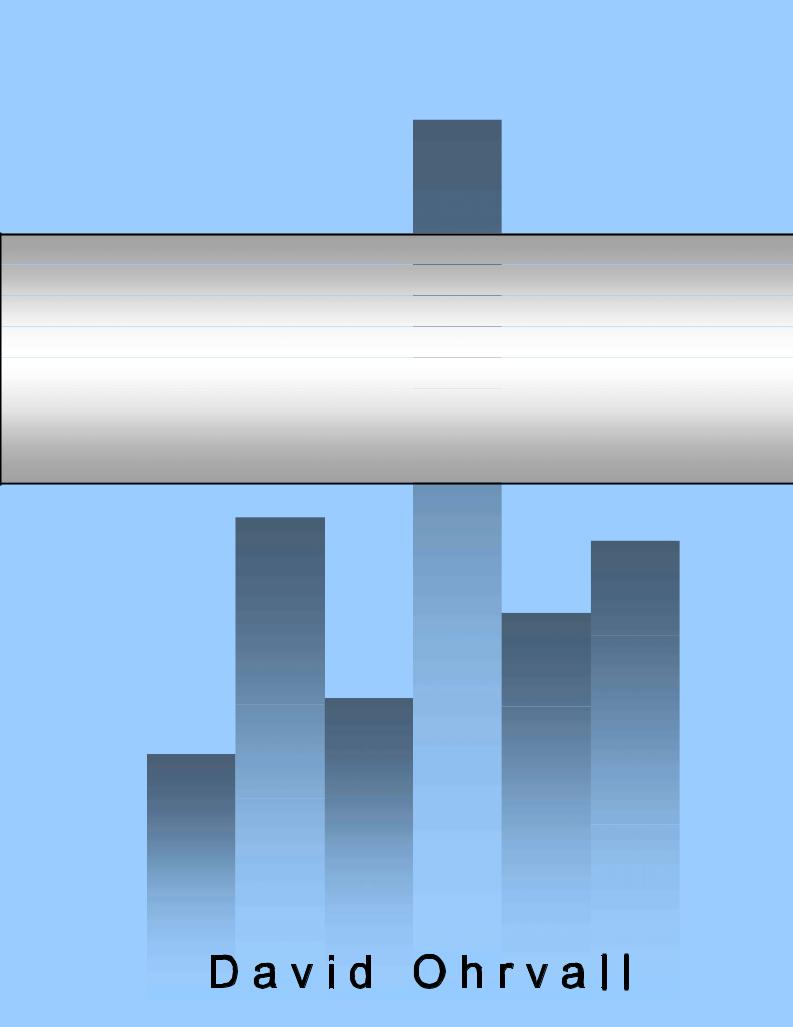
crack the case
.pdf
2 0 0 5 E d i t i o n
Crack the Case
How to Conquer
Your Case Interviews
This book is dedicated to my dad, who ignited my interest in business; my mom, who taught me how to read people and to trust my intuition; and Shiloah, my beautiful wife who with intelligence, wit, patience and perseverance has made this book and our business a successful reality.
Crack the Case: How to Conquer Your Case Interviews, 2005 Edition. Copyright © 2004 by David L Ohrvall. All rights reserved. Printed in the United States of America. No part of this book may be reproduced in any form or by any electronic or mechanical means including information storage and retrieval systems without permission in writing from the publisher. Published by Turtle Hare Media, PO Box 941, Naperville, IL 60566.
Visit our website at www.consultingcase.com for information and to order additional copies.
Although the author and publisher have made every effort to ensure the accuracy and completeness of information contained in this book, we assume no responsibility for errors, inaccuracies, omissions, or any inconsistency herein. Any slights of people, places or organizations are unintentional.
First printing September, 2003 Second edition September, 2004
Ohrvall, David L
Crack the Case: How to Conquer Your Case Interviews
ISBN 0-9744428-3-6
ATTENTION CORPORATIONS, UNIVERSITIES, COLLEGES, AND PROFESSIONAL ORGANIZATIONS: Quantity discounts are available on bulk purchases of this book for educational or gift purposes. For information, please contact Turtle Hare Media, PO Box 941, Naperville, IL 60566; service@consultingcase.com

Crack the Case
How to Conquer Your Case Interviews
2005 Edition
Contents
Foreword |
4 |
Introduction: Something’s Broken |
5 |
Part 1 What Really Matters
Chapter 1 |
A View from Behind the Interview Desk |
9 |
Chapter 2 |
Business Case Interviews – The Main Thing |
19 |
Part 2 One Model/One Method
Chapter 3 |
The Maximum Value Model™ |
29 |
Chapter 4 |
The FRAME Method™ |
48 |
Part 3 |
An Insider’s View |
|
Chapter 5 |
The Interview Timeline |
61 |
Chapter 6 |
Behind Closed Doors |
72 |
Part 4 Perfect Preparation |
|
|
Chapter 7 |
Wrong Turns and Dead Ends |
81 |
Chapter 8 |
Build Your Base in 15 Hours |
85 |
Chapter 9 |
Ten Interactive Practice Case Packs |
108 |
consultingcase.com
Copyright © 2004 David L Ohrvall All rights reserved. |
serious case interview prep |
Foreword
Dear Readers,
Welcome to the 2005 Edition of Crack the Case: How to Conquer Your Case Interviews!
This volume updates the original Crack the Case guide published in September 2003.
I would like to thank my readers for their enthusiastic response to Crack the Case. The book was warmly welcomed by several leading business schools and I personally received a great number of positive testimonials, encouraging notes, and helpful feedback over the course of the last year. Much of this feedback has been incorporated into the 2005 Edition.
I am also grateful for my coaching clients, the very focused and talented individuals who met with me one-on-one to sharpen their case-solving skills. Working with over one hundred and fifty clients in the last twelve months has helped me to refine my methods and develop additional recommendations to optimize case interview performance.
My One Model / One Method approach remains the core of Crack the Case. The 2005 Edition contains the following changes to enhance your case interview preparation and make the concepts introduced in the book easier to practice and apply:
Reformatted Case Packs: These tough cases have the same content as before but are even easier to use in your practice sessions. I have added an innovative Case at a Glance section and simplified notes for the interviewer.
Interviewer/Candidate Evaluation Sheets: I have also added two new assessment sheets for the “Interviewer” and “Candidate” to complete at the end of the case. These sheets ask you to rate the case performance on a scale of 1 to 6 in four critical areas:
Planning & Logic, Communication & Composure, Analytics, and Recommendation.
Expanded hypothesis explanation: I have provided additional information on how you can use this mental “anchor” to help you focus your questions and solve your cases quickly and effectively.
I hope this book is a useful stepping stone to the job of your dreams. I would love to hear any feedback you have on my materials. I can be reached through my website at david@consultingcase.com.
Best of luck with your case interviews!
David Ohrvall
September 2004
4
Introduction
Something’s Broken
“Success is more a function of consistent common sense than it is of genius.” - An Wang
I hung up the phone and ticked off the evening’s final ding call. This last conversation had been rough. The candidate was one of twelve I had interviewed that day. On paper, he was an outstanding prospect: before entering the Wharton School, he had spent three years at an investment bank; he had a bachelor’s degree in mathematics from Northwestern; and his GMAT score was 720. In person, he was even more impressive than his resume suggested. Thoroughly professional, very friendly, and obviously intelligent, he seemed the perfect consultant.
There was only one problem: he bombed my case. He couldn’t frame a good approach to the case, which involved a large travel agency losing corporate clients. He tried to apply a well-known business framework, but it wasn’t appropriate for a company in the service sector. The interview wasn’t all bad—he shined on the quantitative aspects, speeding through the calculations and projections that had tripped up several other candidates that day. But when our time was up, he was nowhere near a solution, let alone recommendations for our “client.”
When he asked for feedback over the phone, I tried to be as specific as possible without further discouraging him. Most consulting firms had already interviewed on his campus. I knew his chances of getting an offer from one of the top firms were dwindling. What could I say that would help him improve for next time? Would there even be a next time?
I wondered why he had such trouble with my case. He had prepared for his interviews using the various case interview guides and practice cases on the market, and like most other students at top MBA programs, he was accustomed to working hard and achieving results. Why should preparing for a case interview be any different?
5

The answer: it’s not. With the right tools and the right kind of practice, you can learn to solve the toughest business cases like a seasoned consultant.
Crack the Case is the result of my firsthand experience interviewing MBA and undergraduate candidates at the top business schools in the country. It is the result of nine years in consulting, serving thirty different companies across a dozen industries. And it’s the result of solving complex business problems side by side with some of the brightest minds in management consulting.
My Philosophy
The focus of Crack the Case is the business case interview. Why? Because business cases now comprise the majority of case interviews given to MBA candidates. The top consulting firms are moving away from using brainteasers and simple market sizing questions for a variety of reasons:
 Brainteasers are less complicated than business cases and therefore don’t sift out the star candidates as effectively as business cases do;
Brainteasers are less complicated than business cases and therefore don’t sift out the star candidates as effectively as business cases do;
 Brainteasers do not showcase a candidate’s general business knowledge; and
Brainteasers do not showcase a candidate’s general business knowledge; and
 Candidates are, across the board, improving their performance on brainteasers due to the existence of several good study guides on the topic.
Candidates are, across the board, improving their performance on brainteasers due to the existence of several good study guides on the topic.
The firms expect you to have an aptitude for crunching the numbers. But they want to see you do it in the context of a business problem.
A complex business case naturally includes a quantitative element. The firms expect you to have an aptitude for crunching the numbers. But they want to see you do it in the context of a business problem.
My Passion
Teaching is my passion. I love showing people new and better ways to do things; I get excited about making complicated concepts easy to understand. Training has been a common thread in my career, even predating my years in consulting. During college I moved to Japan for two years and supported myself by teaching English. At Arthur Andersen, I mentored and trained many new hires in a department that grew from five consultants to fifty during my time with the firm. At Bain & Company, I directed my office's training programs for new consultants, instructed new hires at global training sites, and held the role of Chicago Knowledge Officer.
6

Crack the Case reflects my passion for teaching. I developed the Maximum Value Model™ and the FRAME™ Method to equip you with the tools you need to succeed in your case interviews. My approach to solving business cases fills a critical gap in the resources available today. Other case guides say you should solve cases by applying well-known business frameworks—the exact opposite of what the top consulting firms are saying.
Crack the Case shows you how to solve your cases like a seasoned consultant. I have designed ten comprehensive practice cases tailor-made for mock interviewing. My common sense approach, One Model/One Method™, is easy to understand, easy to remember, and easy to apply under the pressure of an interview.
My Promise
Crack the Case reinvents case interview preparation. You will not find the tired old frameworks in this book. Nor will you find practice cases with “Hollywood scripts” for solutions. You will not find “short” lists of ninety-plus questions to memorize.
Instead, you will find:
Mental roadmaps and a few key questions to help you drive through your cases with direction and confidence
A structured approach that keeps you logical and focused on the data
Ten tough practice cases coded by difficulty level
A firsthand account of the interview and selection process
Insights gleaned from interviewing scores of candidates
Are you ready to raise your game to the next level? Welcome to Crack the Case. I look forward to working with you.
David Ohrvall
7

Part 1
What Really Matters
Crack the Case: |
|
How to Conquer Your Case Interviews |
consultingcase.com |
Chapter 1
A View from Behind the Interview Desk
“Did you crack the case?”
About five minutes had passed in my first interview with a Bain & Company partner. It was the first of two interviews I would have that morning—the “fit” interview, to be followed by a case interview. The partner’s job was easy. He would determine whether I suited the Bain culture and might make a good summer intern. I thought the interview was going very well. We had a nice exchange about the firm, why I was interested in management consulting and why he thought Bain was the best place to work. And then I felt things start to slip.
I couldn’t put my finger on it. Maybe it was intuition from several years of client meetings. Maybe it was a slight change in his body language. Whatever the source, I knew he was mentally tossing me in the “ding” bucket. And there was no way I would let that happen without a fight. My blood pressure rising by the second, I took a risk and asked him point blank, “What problem do you have with my working for Bain this summer?”
He blinked in surprise, then paused awkwardly. Finally, he spoke: “Well, let me see,” he said, pulling out my resume again. “To me you seem like the kind of person who would fit well at EDS [systems consulting] or Andersen [Ouch! I had just come from there!]. So my question to you is: did you crack the case?”
All I could do was smile and say, “We’ll find out soon. My next interview is the case.” We shook hands and I left. I cracked that first case. Within the next two days I went to the final round, cracked three more cases, and was offered the job.
9

My own entrance into management consulting is a lesson how quickly an interviewer can make decisions about a candidate. It is also a lesson how each candidate has the power to change the course of an interview. Like everyone else, I had prepared for my case interviews using whatever materials and mock interview partners I could find. But to be honest, I still felt unprepared and incredibly nervous.
“Did you crack the case?” This question sums up the purpose of the case interview. Cracking a case is not a matter of finding the one right answer. Nor is it a matter of simply saying all the expected things during the interview. To crack a case is to systematically solve a business problem using logic and data in an organized manner. It is one of the few objective criteria firms can use to evaluate and compare you to other candidates.
Some schools do not disclose MBA grades. Undergraduate performance is somewhat dated and is considered before interviews, not afterward. GMAT scores help, but almost all candidates are above the “high” threshold. Looks, personality and manners do play minor roles, as I’ll discuss later. But in the end, it always comes down to the case.
In the firms’ view, your performance during the case interview is the best predictor of your future success.
As I interviewed MBA’s and undergraduates and talked with other interviewers, I found the “crack the case” mentality to be a constant theme. Why? Because a case interview is a unique tool that allows the firms to “test drive” their candidates, to assess their mental horsepower, and to preview their ability to communicate with clients. In the firms’ view, your performance during the case interview is the best predictor of your future success.
In this chapter, I’d like to give you a glimpse into the mind of a typical interviewer talking with two different candidates. Both look great on paper, with comparable backgrounds and experience. They are from the same school and have similar GPA’s and GMAT scores. What will differentiate them as they try to solve this basic profitability case? Read on.
Meet Danny Ding
Minutes 0-2
Danny’s a nice guy. He steps forward quickly after I call his name in the waiting room where twenty-five candidates are sitting, making small talk with the greeters. Firm handshake. Good eye contact. Nice smile and a few pleasant comments about the weather. I like this guy; we’re off to a good start as we walk to the interview room. Today we’re in a fancy hotel suite, and I motion for him to take the seat across the desk from me.
10
